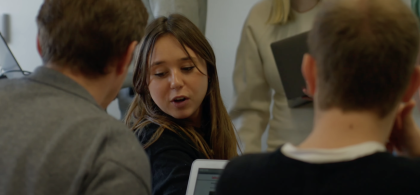
“The ability to innovate is becoming an essential skill”
Published on 17/10/2025
At NEOMA, we teach the students to adapt to an ever-changing world and to innovate. Why is this essential and how do you teach it? Delphine Manceau, our Dean, gives her response to these questions.
Why is it important to develop the spirit of innovation in today’s 18-25-year-olds?
We are all well aware that the world is undergoing ever more frequent and radical transformations. Technological evolutions take place with ever-increasing speed. AI obviously represents a massive factor in this acceleration which will, in the near future, produce ‘super intelligences’ capable of teaching themselves.
We are also living in a much more uncertain world in terms of geopolitics. For the first time, we are seeing signs of a ‘deglobalisation’. Climate change is another challenge. Innovation is needed here too in order to invent new models.
All these in-depth evolutions are forcing all generations to regularly review their vision of the world. And for our graduates, it means being factors of positive innovation in businesses by helping them to reinvent themselves on a regular basis. Their role is to contribute to activities with a positive impact on organisations and society.
What impact does this have on ways of teaching?
This emphasis on the ability to innovate is leading us to evolve the content of our courses and our teaching methods. In terms of content, we teach management of innovation and creativity. Students must, of course, learn to control generative artificial intelligence, understand and analyse data, and use digital tools. They have to know how to use them, while remaining aware of their biases and limitations. We also focus on points of reference for a world changing so fast, for example our new course on literature and the way great literary texts reflect on management, innovation, creativity and so on.
In terms of teaching strategy, many case studies, projects and actions aim to promote new ways of presenting problems and asking questions.
The strength of business schools is that they have teaching staff and researchers working on these issues, who can best help grasp these changes and transitions. In our faculty, we have also drawn up 10 guidelines which influence the whole of our teaching, in order to promote this innovative mindset.
What is the place of soft skills in this evolution?
The teaching team at NEOMA has drawn up a first frame of reference of behaviour skills to strengthen the students’ ability to adapt and innovate.
The first group of skills involves a forward thinking mindset, that is, a state of mind looking to the future, and to its potential: conceptualising and creativity skills, an enquiring mind, analytical skills and the ability to solve complex problems.
Other soft skills are essential to navigate uncertainty: interpersonal, cultural and collaborative skills, and decision-making in a complex environment.



